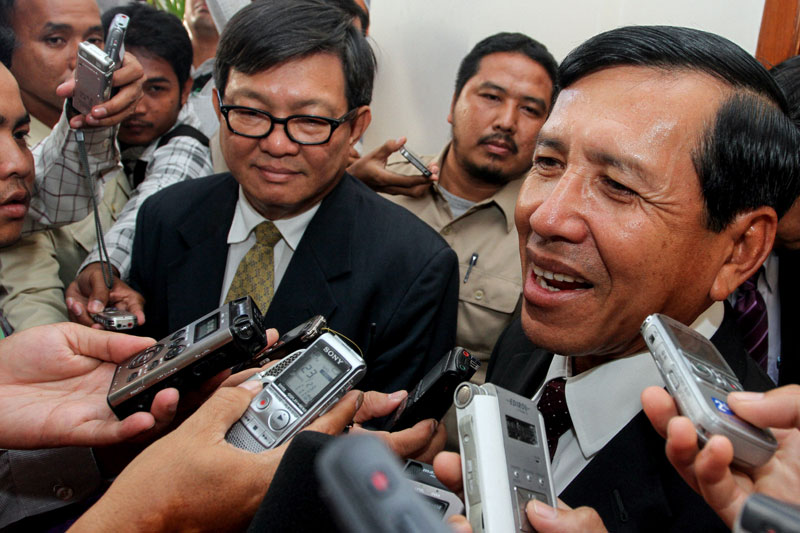Opposition negotiators were demanding last year’s July 22 political deal include concrete vows to depoliticize the military and courts in a comparable fashion to the National Election Committee (NEC) but suddenly abandoned the demands in the final days, those involved have said.
Last year’s deal was abruptly signed a week after seven CNRP-lawmakers elect were imprisoned over a violent protest at Freedom Park, and ended the opposition party’s protests of the 2013 election results in exchange for vows that the CPP-dominated NEC would be overhauled.

However, CNRP negotiators had been holding out to secure vows to also neutralize the CPP’s control of the military and the courts when further talks ended, senior opposition lawmaker Son Chhay said in an interview last week.
“In our draft agreement in July last year, we had a proposal for the two parties to work together to reform a number of institutions. Besides the judicial system, we were looking to the military as well as public administration,” said Mr. Chhay, who led the CNRP in initial talks with the CPP after the election.
“Those were the three important things we wanted. For some reason, the agreement wrapped up rapidly and I was not able to introduce this for both parties to put into the agreement.”
Mr. Chhay declined to comment further Tuesday on the CNRP’s specific demands but said reform of the NEC, the keystone of the July 22 deal, was only one among many reform promises the opposition wanted.
“When we were talking about the country’s institutions, it was the armed forces, the judiciary, the Constitutional Council, the NEC, the Supreme Council of the Magistracy. All these needed to become independent,” he said.
Interior Ministry Secretary of State Prum Sokha, one of the CPP’s main negotiators who on the day of the political deal also served as the ruling party’s spokesman, said Tuesday that such issues were never discussed seriously during the talks.
“We did not negotiate it or discuss in any detail such matters. What we talked about in detail was signed by the two parties. The other matters, we just sometimes raised it but never reached an agreement on it,” Mr. Sokha said.
“You know, the agreement has been signed already, and now it only depends on the two parties respecting this agreement and following this agreement trustfully.”
Many high-ranking members of the Royal Cambodian Armed Forces (RCAF) are prominent members of the CPP, including its top commander, Pol Saroeun, who like his predecessor sits on the ruling party’s standing committee.
Many have long criticized the relationship, with civil society leaders last week questioning whether the military would respect a CPP loss at the 2018 national election after Deputy RCAF Commander Chea Dara announced last Wednesday that “the army belongs to the Cambodian People’s Party.”
Opposition leader Sam Rainsy on Tuesday declined to comment on last year’s talks and said only that the CNRP had not abandoned its demands that the ruling party promote the depoliticization of the military and courts.
“We have never dropped those demands,” Mr. Rainsy said in an email. “Please ask details from my colleagues who attended the July 22, 2014 summit meeting.”
CNRP lawmaker Eng Chhay Eang, another of the opposition’s lead negotiators in postelection talks, said the party’s demands for specific depoliticization vows had to be replaced with a more general article to allow the deal to be finalized swiftly in July 2014.
“That article mentions that the two parties agree to reform some of the main institutions, but we did not mention very specifically which sectors would be physically reformed, we just say it in general,” Mr. Chhay Eang said.
“When we say ‘reform the main institutions,’ that is enough to cover those fields, because [otherwise] the deal would not have been reached within a day, it would have taken several weeks or months if we were very specific,” he added.
“The most important thing was the elections, because we want the next elections to be free and fair.”



